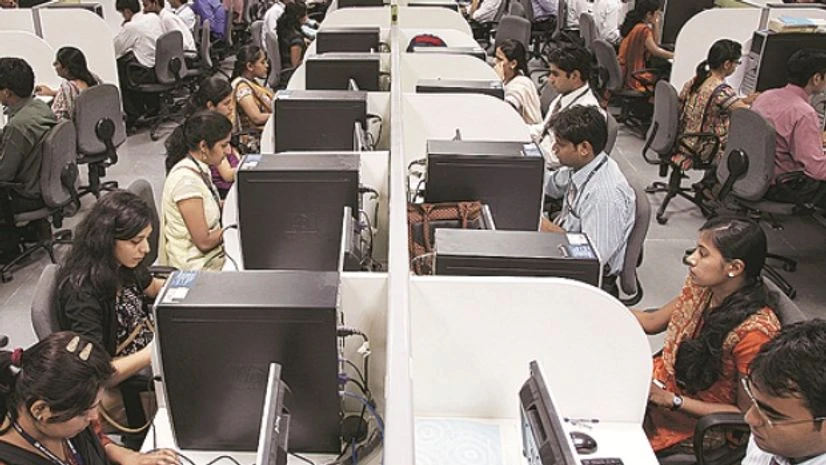The issue of moonlighting by tech professionals has ignited a fresh debate, polarising opinions and raising thorny legal questions, though many believe that staff's gradual return to office floors will likely ease the concerns.
Moonlighting refers to employees taking up side gigs to work on more than one job at a time.
With the vexed issue now in the spotlight, some industry watchers expect employers to consider extra safeguards to protect proprietary information and operating models, especially where employees are working remotely. Companies, analysts say, could also turn tougher on exclusivity clauses in employment contracts.
That said, employers may feel somewhat reassured as tech workers trickle back in, and the office cubicles start to get occupied more regularly.
While the practice of moonlighting emerged as a big talking point after Wipro Chairman Rishad Premji flagged the issue, equating it to "cheating", the industry's take on it is rather divided.
Also Read
Tech Mahindra CEO C P Gurnani tweeted recently that it is necessary to keep changing with the times and added, "I welcome disruption in the ways we work."
IT industry veteran and former director of Infosys, Mohandas Pai told PTI that low entry-level salary in tech industry has contributed to moonlighting. During the pandemic, Pai said, there was a surge in gig opportunities as "everything went digital".
"If you don't pay people well, they say I want to earn more money and here is the easy way of earning well because technology is available...I get paid in dollars very well, I can earn more... and so that is attractive," he observed.
Pai contends that salaries of freshers in the software industry have not seen much improvement in the last 10 years, and professionals are, in fact, "underpaid" in the first 3-4 years of their career.
"The gig economy has opened up, and there are lot of gig platforms globally where one can register and work for anybody around the world. And they will pay for pieces of work," he explained.
Pai feels that while employees should not indulge in outside work during the time committed to their companies, nor leverage intellectual property, asset or resources of their employers for other purposes, individuals' free time is their own.
"Outside that time (work hours), what you do, is your problem," he asserted.
Pai estimates that 6-8 per cent of people indulge in moonlighting now, as against 1-2 per cent earlier.
Tech workers agree moonlighting gained ground after the onset of COVID-19 triggered 'work from home'.
The overnight shift to remote working did away with long commutes, bringing relatively more fluid work schedules. It also yielded new opportunities for juggling smaller side projects in the free time for those keen enough to take them up.
An employee working for a prominent tech company said that while the practice is not rampant, instances of moonlighting are not unheard of in IT circles. Work schedules, at the start of the pandemic, were not uniform and lean periods offered plenty of bandwidth.
Before COVID, physical presence at office also acted like a mental firewall, another IT professional said on conditions of anonymity, adding that when the pandemic struck, plenty of gigs from website development to app creation were up for grabs.
Being short duration stints, these one-off projects were also seen by some as quick ways to supplement income. Since they did not involve full-time engagement, workers opting for such side jobs did not see it as a direct conflict of interest.
Nascent Information Technology Employees Senate (NITES), a Pune-based union, says extra freelance work done by an individual in their own time utilising their personal resources is "justified".
"If employment letter mentions working for 9-12 hours daily, and in case in that timeslot the person is not working for the company or is giving that time to another organisation, that can be termed as a breach.
"However, after office hours what the individual does is their own prerogative," observed Harpreet Singh Saluja, president of NITES.
P V Ramana Murthy, Head of Employment and Labor Laws, Economic Laws Practice (ELP), believes clarity in the contracts and full transparency will reduce disputes and also bring down the cost of labour, enabling flexibility for both the employer and employees.
"As of now, there is no clarity in the employment contracts and no prohibition under the Indian employment law, (except under the Factories Act, where dual employment is prohibited for workmen). Moonlighting falls under the grey zone," according to Murthy.
Vaibhav Bhardwaj, Partner at Induslaw, says as most of the organisations are returning to normalcy and requiring employees to work out of the office, it would be difficult for staff to moonlight.
Several employers are considering more protective safeguards with respect to proprietary information, policies and operating models, especially in cases of remote working, said Pooja Ramchandani, Partner, Employment Law, Shardul Amarchand Mangaldas and Co.
"It's not just IT companies, across industries employment contracts have exclusivity clauses, clauses on conflict of interest and obligations to serve only one employer during the period of employment. Moonlighting falls foul of these provisions," Ramchandani added.
(Only the headline and picture of this report may have been reworked by the Business Standard staff; the rest of the content is auto-generated from a syndicated feed.)

)
